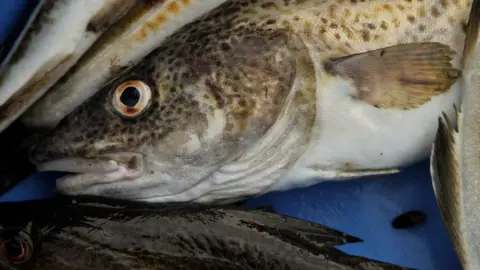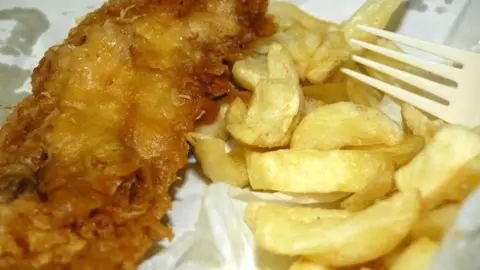North Sea cod certification suspended by Marine Stewardship Council
 Getty Images
Getty ImagesNorth Sea cod is to lose its sustainability certification due to concerns about stock levels.
The Marine Stewardship Council said certificates for North Sea cod fisheries would be suspended as stocks were below the "safe biological level".
A "blue tick" had been awarded in 2017, meaning cod could be eaten "with a clear conscience".
The Marine Stewardship Council (MSC) said the suspension was "devastating" but that stock levels were "worrying".
The Scottish government said the loss of accreditation for cod stocks was "very disappointing".
The fish had been considered under threat for more than a decade after stocks were said to have fallen to about 40,000 tonnes in 2006.
The industry agreed measures to help regenerate the population, including new nets and closing spawning areas to fishing.
However in June, the International Council for the Exploration of the Sea (Ices) warned cod was being "harvested unsustainably".
 PA Media
PA MediaIces said stocks in the North Sea had plummeted to critical levels, and recommended a catch reduction.
Erin Priddle, MSC programme director for UK and Ireland, said: "The decline in the North Sea cod stock is a worrying development, with the latest stock models suggesting that the fishery has not recovered as well as previously thought.
"The MSC programme was established to recognise and reward sustainable fisheries and is designed to identify when certified fisheries are not performing as they should against our standard.
"While this news is devastating for industry, it is a testament to the MSC standard working as it should. Now, more than ever, we need coordination and cooperation for the sustainability of our oceans and the marine life within."
Onboard monitoring
Mike Park, chairman of the Scottish Fisheries Sustainable Accreditation Group (SFSAG), said: "The industry are concerned that, notwithstanding their best efforts to continue to rebuild North Sea cod, some developments are taking place that seem beyond their control.
"That said, they are committed to introducing balanced and proportionate measures in an attempt to reverse the decline."
The announcement was "no surprise" said environmental charity WWF, which added that governments must ensure the UK's fisheries are better managed.
"That starts with a new, ambitious and effective Fisheries Bill in Westminster, with a clear duty to fish sustainably and prove accountability with onboard monitoring," said Helen McLachlan, the charity's fisheries programme manager.
"At the moment, less than 1% of fishing boats are monitored at sea and this has to change. Onboard cameras and sensors are essential to avoid the further decimation of fish populations.
"We must recover and protect the UK's seas, if we are to build climate resilience and a long-term future for our marine wildlife and the fishing fleets and coastal communities that depend so heavily on it."
A Scottish government spokeswoman said: "The loss of accreditation for this iconic stock is very disappointing. We are working with the industry and with other fishing nations to establish the multi-national response needed to ensure sustainable fishing while maintaining economic fleet viability.
"We are long-standing champions of the Scottish fishing industry and will continue to ensure the needs of industry, coastal communities and the marine environment are met, with sustainable and inclusive growth across all sectors."
